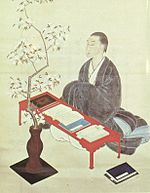- Motoori Norinaga
-
Motoori Norinaga 
Self-portrait by MotooriBorn 21 June 1730 Died 5 November 1801
MatsuzakaNationality Japan Other names 本居 宣長 In this Japanese name, the family name is "Motoori".Motoori Norinaga (本居 宣長, 21 June 1730 – 5 November 1801) was a Japanese scholar of Kokugaku active during the Edo period. He is probably the best known and most prominent of all scholars in this tradition.
Contents
Life
Norinaga was born in Matsuzaka of the province of Ise (now Matsuzaka City in Mie prefecture). He was the second son of the Ozu merchant house of Matsuzaka (the film director Yasujirō Ozu was a descendant of the same line). After his elder brother’s death, Norinaga succeeded to the Ozu line. At one stage he was adopted out to a paper-making family but the bookish boy was not suited to business.
It was at his mother's suggestion that, at the age of 22, Norinaga went to Kyoto to study medicine. In Kyoto, he also studied Chinese and Japanese philology under the neo-Confucianist Hori Keizan. It was at this time that Norinaga became interested in the Japanese classics and decided to enter the field of Kokugaku under the influence of Ogyū Sorai and Keichū. (With changes in the language, the ancient classics were already poorly understood by Japanese in the Edo period and texts needed philological analysis in order to be properly understood.) Life in Kyoto also instilled in the young Norinaga a love of traditional Japanese court culture.
Returning to Matsuzaka, Norinaga opened a medical practice for infants while devoting his spare time to lectures on the Tale of Genji and studies of the Nihon Shoki (Chronicles of Japan). At the age of 27, he bought several books by Kamo no Mabuchi and embarked on his Kokugaku researches. As a doctor, he adopted the name of one of his samurai ancestors, Motoori.
In 1763, Norinaga met Mabuchi in person when the latter visited Matsuzaka, a meeting that has come down in history as ‘the night in Matsuzaka’. Norinaga took the occasion to ask Mabuchi to supervise his annotations of the Kojiki (Records of Ancient Matters). Mabuchi suggested that Norinaga should first tackle the annotations to the Man'yōshū in order to accustom himself to the ancient kana usage known as the man'yōgana. This was the only meeting between the two men, but they continued to correspond and, with Mabuchi’s encouragement, Norinaga later went on to full-fledged research into the Kojiki.
Norinaga’s disciples included Ishizuka Tatsumaro, Nagase Masaki, Natsume Mikamaro, Takahashi Mikiakira and Motoori Haruniwa (Norinaga’s son).
Although overshadowed by his activities as a Kokugaku scholar, Norinaga spent 40 years as a practicing doctor in Matsuzaka and was seeing patients until 10 days before his death in 1801.
Works
Norinaga’s most important works include the Kojiki-den (Commentaries on the Kojiki), made over a period of around 35 years, and his annotations on the Tale of Genji. Norinaga took the view that the heritage of ancient Japan was one of natural spontaneity in feelings and spirit, and that imported Confucianism ran counter to such natural feelings. He criticized Ogyū Sorai for his worship of Chinese civilization and thought, although it has been pointed out that his philological methodology was heavily influenced by Sorai's. His ideas were influenced by the Chinese intellectual Wang Yangming (Ō Yōmei in Japanese), who had argued for innate knowing, that mankind had a naturally intuitive (as opposed to rational) ability to distinguish good and evil.
Hitherto scholars of ancient literature had shown a preference for the grandness and masculinity of Man'yōshū poetry and an aversion to works like the Tale of Genji, which were regarded as unmanly and feminine. Norinaga resurrected the position of the Tale of Genji, which he regarded as an expression of mono no aware, a particular Japanese sensibility of "sorrow at evanescence" that Norinaga claimed forms the essence of Japanese literature.
In undertaking his textual analysis of ancient Japanese, Norinaga also made vital contributions to establishing a native Japanese grammatical tradition, in particular the analysis of clitics, particles and auxiliary verbs.
Timeline
- 1730 - Born as second son
- Education:
- At the age of seven could already read and write
- 11 years old reciting Noh theatre pieces and Confucian classics
- 13y. visiting the shrine of Yoshino
- 16y. archery
- 18y. Japanese tea ceremony
- 19y. advanced Confucian training
- 1748 - Norinaga is adopted by the Imaida family, reversed after only 2 years.
- 1751 - His stepbrother dies.
- 1752 - Goes to Kyoto to study medical science
- 1752-57 - Some scholars note his productivity. Motoori produces 2000 Waka and 40 books and copies 15 others.
- 1757 - Reads Kamo no Mabuchi's first book, Kanji kō. Lacking money he returns to his hometown to open a medical practice.
- 1760 - Enters arranged marriage with Murata Mika, divorced after 3 months.
- 1762 - Marries Kusubuka Tami and one year later their son Haruniwa is born.
- 1763 - Meets Kamo no Mabuchi who tells him to read the Nihonshoki and the Man'yōshū
- 1764-71 - Studies the Kojiki, and begins to spread his teachings.
- 1799 - Motoori Ōhira became his adopted son.
- 1801 - Dies.
See also
- Kokugaku
- Kojiki
- Japanese poetry
- Japanese nationalism
- Hagiwara Hiromichi
- Motoori Ōhira
- Motoori Haruniwa
External links
Categories:- Kokugaku scholars
- Japanese philosophers
- Japanese linguists
- Japanese writers of the Edo period
- Japanese poets
- 1730 births
- 1801 deaths
- Japanese Shintoists
- People from Mie Prefecture
Wikimedia Foundation. 2010.
